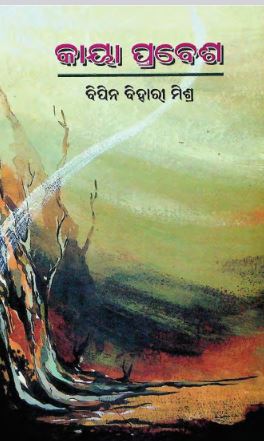In the vibrant literary landscape of Odisha, certain works transcend the boundaries of time and etch themselves into the cultural consciousness. One such remarkable contribution is “Kaya Prabes,” a compilation of captivating short stories authored by the illustrious Bipin Bihari Misra and published in 2007. Misra, known for his profound storytelling and keen understanding of human emotions, weaves an intricate tapestry of tales that resonate deeply with readers of all ages.
“Kaya Prabes” is not merely a collection of stories; it is a literary journey that navigates through the various facets of the human experience. Each story stands as a testament to Misra’s ability to delve into the complexities of life while maintaining an enchanting simplicity that appeals to both the heart and the mind. The book’s title, which translates to ‘Entering the Body,’ metaphorically represents the exploration of human emotions, relationships, and existential questions.
One of the captivating sub-stories in “Kaya Prabes” is “Badhu Thiba Jhia” (The Borrowed Daughter), which delves into the theme of familial bonds and the sacrifices made for love. The narrative follows the life of a young girl who is adopted by a family in dire straits. As she grows and becomes an integral part of the family, the story poignantly depicts the universal struggles of acceptance, belonging, and sacrifice. Misra’s deft characterization and emotional depth allow readers to traverse the delicate heartstrings of the characters, evoking empathy and introspection.
Another notable tale, “Chhata” (The Umbrella), masterfully showcases Misra’s ability to interweave socio-political elements with personal stories. Set against the backdrop of rural Odisha, this story encapsulates the life of a humble villager who comes across an umbrella, a symbol of aspiration and status in his community. Through this seemingly simple narrative, Misra subtly addresses issues of class disparity, dreams, and human dignity, leaving readers to reflect on the broader social implications.
“Dhuli” (The Dust) is yet another gem in this anthology, unraveling the story of a man who confronts his inner demons and past regrets. The narrative’s brilliance lies in its reflective tone, as it encourages readers to ponder the existential themes of mortality, redemption, and the cycle of life. Misra’s evocative prose and philosophical insights lend a haunting beauty to this tale, making it a memorable read.
“Kaya Prabes” stands out not only for its compelling narratives but also for its linguistic beauty. Misra’s command over the Odia language is evident in every page, as he employs a lyrical yet straightforward style that enhances the storytelling experience. The rich cultural tapestry of Odisha is seamlessly woven into each story, offering readers an immersive experience that is simultaneously intimate and universal.
Since its publication in 2007, “Kaya Prabes” has been embraced by readers and critics alike, solidifying Bipin Bihari Misra’s reputation as a master storyteller. The anthology’s enduring appeal lies in its exploration of timeless themes through relatable characters and situations, making it a cherished addition to Odia literature.
In conclusion, “Kaya Prabes” is not just a collection of stories; it is a reflection of the human spirit, its aspirations, struggles, and triumphs. Misra’s unparalleled storytelling prowess and profound thematic exploration make this anthology a must-read for anyone seeking to delve into the depths of human emotions and the beauty of Odia literature.
Books Info
| Books name | Kaya Prabes/କାୟା ପ୍ରବେଶ |
| Author | Bipin Bihari Misra |
| No Of pages | 202 |
| Publisher | Gyanajuga Puiblications |
| Publication | 2007 |
| Printed At | Creative Offset |
| Distributor | NA |

